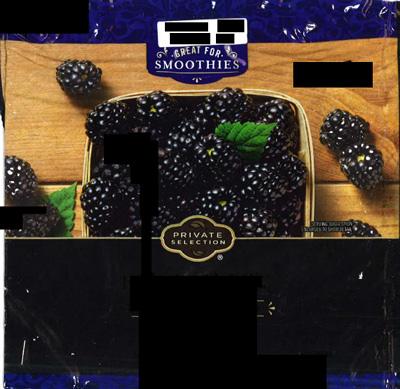 By Miriam Raftery
By Miriam Raftery
June 9, 2019 (Washington D.C.) — The FDA is warning consumers about hepatitis A virus (HAV) contamination of frozen packages of blackberries and triple berry medley products. The “private selection” products made by Kroger were sold in Kroger, Ralph’s, Food 4 Less, Dillons, Fred Meyer and other grocery chains across the U.S.
The contamination was found as part of an ongoing berry sampling. The recalled products have a long shelf life with best-by dates through June and July of 2020:
- PRIVATE SELECTION FROZEN TRIPLE BERRY MEDLEY, 48 OZ (BEST BY: 07-07-20; UPC: 0001111079120);
- PRIVATE SELECTION FROZEN TRIPLE BERRY MEDLEY, 16 OZ (BEST BY: 06-19-20; UPC: 0001111087808);
- PRIVATE SELECTION FROZEN BLACKBERRIES, 16 OZ (BEST BY: 06-19-20, 07-02-20; UPC: 0001111087809)
If you’ve eaten any of these frozen berries since May 24, and you haven’t had the hepatitis A vaccine, the FDA recommends that you talk with your doctor about getting vaccinated, even if you haven’t become ill. If you’ve already been vaccinated or previously had hepatitis A, you do not need the vaccine.
HAV can result in a liver infection that may not be apparent. However, when symptoms occur, they can range in severity from a mild illness lasting a few weeks to a severe illness lasting several months. HAV is found in the stool and blood of people who are infected.
HAV is spread when someone ingests the virus, usually through person-to-person contact or from eating contaminated food or drink. Contamination of food with the hepatitis A virus can happen at any point: growing, harvesting, processing, handling, and even after cooking.
Hepatitis A can have a long incubation period and can have serious health consequences for some people, especially those who are immune-compromised. People infected with HAV may not have symptoms until 15 to 50 days after exposure, which often makes it difficult to determine the exact exposure that led to illness.
Symptoms may include fever, headache, fatigue, loss of appetite, nausea, vomiting, diarrhea, abdominal pain, yellowing of the skin or eyes (known as jaundice), dark urine, and pale stool. Young children may not show symptoms of HAV infection.
At this time, the FDA and the Centers for Disease Control and Prevention (CDC) are not aware of any cases of hepatitis A linked to the consumption of Kroger Private Selection brand frozen blackberries.
The FDA is continuing to investigate to determine if there are other implicated products.
The FDA encourages consumers with questions about food safety to call 1-888-SAFEFOOD Monday through Friday between 10 a.m. and 4 p.m. Eastern time, or to consult.







Comments
Berries
Bad news. Berry berry bad news.